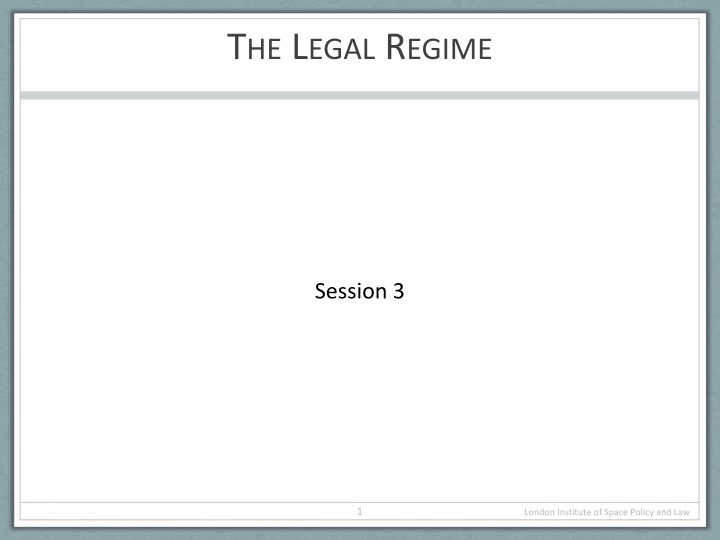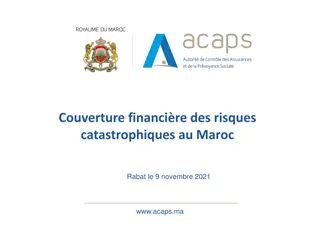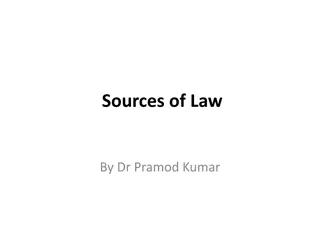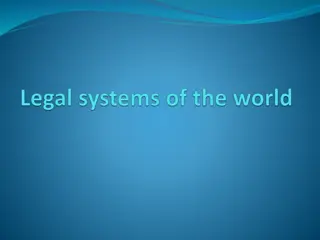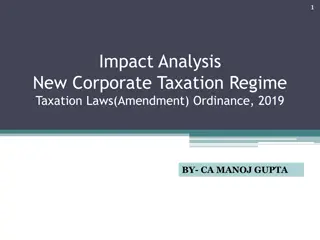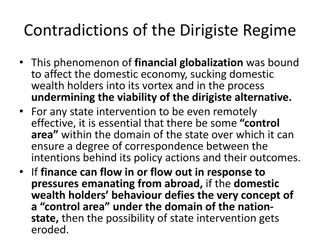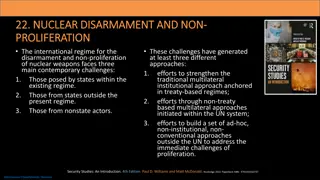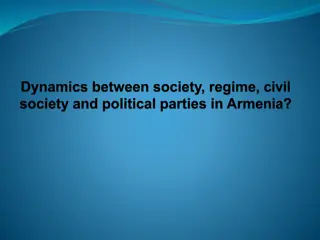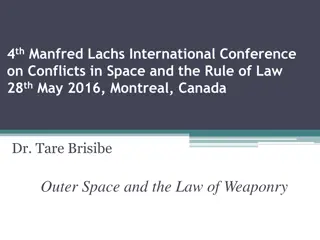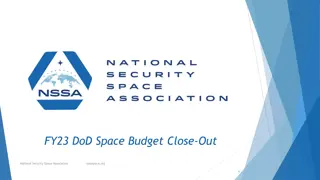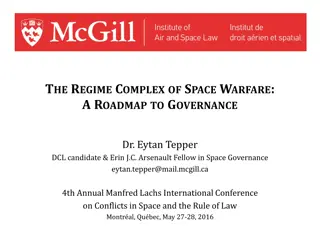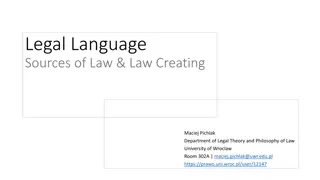Legal Regime and Sources of Space Law
The legal background and sources of space law, including international treaties, UN resolutions, and operational aspects. Learn about the principles governing the exploration and use of outer space.
Download Presentation

Please find below an Image/Link to download the presentation.
The content on the website is provided AS IS for your information and personal use only. It may not be sold, licensed, or shared on other websites without obtaining consent from the author.If you encounter any issues during the download, it is possible that the publisher has removed the file from their server.
You are allowed to download the files provided on this website for personal or commercial use, subject to the condition that they are used lawfully. All files are the property of their respective owners.
The content on the website is provided AS IS for your information and personal use only. It may not be sold, licensed, or shared on other websites without obtaining consent from the author.
E N D
Presentation Transcript
THE LEGAL REGIME Session 3 1 London Institute of Space Policy and Law
LEGAL BACKGROUND Early activities by governments Natural that public international laws govern US and USSR could have had bilateral agreement Need to involve other states since they are affected Multi-lateral agreement through the UN Ad hoc COPUOS formed 1958, Permanent 1959 Members 18 to 24 members now 92 1952 Space Pioneer: [Cyprus, Ethiopia, Finland, Mauritius & Paraguay] Will man outgrow the Earth? STSC and LSC Cooperation Apollo Soyuz Test Project docking 1975 ISS Contribution 2 London Institute of Space Policy and Law
SOURCESOF SPACE LAW International Law Public International Law Private International Law or Conflicts of Law Commercial International Law cf Municipal Law Sources Treaties and Conventions General international law - recognised principles of law ICJ Statute Art 38(1) Judicial Decisions (secondary) Teachings of Leading Scholars (secondary) Multi-lateral Agreements 3 London Institute of Space Policy and Law
UN RESOLUTIONS Resolution 1962 (XVIII), Declaration of Legal Principles Governing the Activities of States in the Exploration and Use of Outer Space 1. Established the main principles Peaceful use Benefit of all mankind with equality among States Avoidance of harmful activities State responsibility and liability Non-appropriation Co-operation 2. Adopted 13 December 1963, later incorporated in OST 1967 4 London Institute of Space Policy and Law
SPACE TREATY OPERATION International scope Treaties binding on States OST articulates the general principles Other treaties and conventions more specific In some jurisdictions treaties are self implementing Municipal laws implement OST and apply to operators Several countries have laws governing certain aspects Some only establish an agency 5 London Institute of Space Policy and Law
UN TREATIES Five international UN treaties 1967 Outer Space Treaty Principles Treaty [109] 1968 Rescue Agreement [98] 1972 Liability Convention [96] 1975 Registration Convention [69] 1979 Moon Agreement [18] Moon Agreement in force 1984 18 ratifications. None of the major space active States. Excludes Brazil, China, France, India, Japan, Russia, UK and USA. Includes Australia, Austria, Belgium, Mexico and Netherlands 6 London Institute of Space Policy and Law
PRINCIPLESOF SPACE LAW Peaceful Use States party to the OST are bound by its Preamble, with many references to peaceful use of outer space. Vienna Convention Art 18 Exclusively peaceful use of celestial bodies. OST Art IV Non-appropriation Outer space, including the Moon and other celestial bodies, is not subject to national appropriation by claim of sovereignty, by means of use or occupation, or by any other means. OST Art II No State can claim any part of space or exclude others from access and use of space. Freedom of over-flight and peaceful use. 7 London Institute of Space Policy and Law
PRINCIPLESOF SPACE LAW Common Interest and Cooperation Continued Exploration and use of outer space, shall be carried out for the benefit and in the interests of all countries, irrespective of their degree of economic or scientific development, [without discrimination on a basis of equality] and in accordance with international law and shall be the province of all mankind. There shall be freedom of scientific investigation in outer space, and States shall facilitate and encourage international cooperation in such investigation. OST Art I Opportunity to other States to observe; Report results OST Arts X-XII Apollo-Soyuz Test Project 1972 - 1975 8 London Institute of Space Policy and Law
SOYUZTO ISS NASA Image 9 London Institute of Space Policy and Law
? NASA Image 10 London Institute of Space Policy and Law
SOLAR ECLIPSE 21 AUG 2018 NASA Image 11 London Institute of Space Policy and Law
PRINCIPLESOF SPACE LAW Access Continued All stations, installations, equipment and space vehicles on the Moon and other celestial bodies to be open to representatives of other States, subject to consultation and advance notice OST Art XII Non-Interference Conduct activities with due regard to interests of other States International consultation before any activity that would potentially cause harmful interference with activities of other States. OST Art IX Compliance with international law Includes UN Charter. OST Art III 12 London Institute of Space Policy and Law
PRINCIPLESOF SPACE LAW International Peace and Security Continued Measures taken by nations and international organizations, to promote mutual survival, safety, co-operation and understanding. OST Art III Distinguish security of the unique space environment to be used safely and responsibly by all, including the physical and operational integrity of manmade assets in space and their ground stations, as well as security on Earth from threats originating in space-based assets Protection of Environment Earth and Space. OST Art IX State Responsibility States are responsible for their national space activities and must authorise and supervise private space ventures. OST Art VI 13 London Institute of Space Policy and Law
PRINCIPLESOF SPACE LAW Non-Interference and State Responsibility Continued 14 London Institute of Space Policy and Law
RESPONSIBILITY National Activity States bear responsibility for national activities in outer space, whether carried on by governmental or non-governmental entities, and for assuring that national activities are carried out in conformity with the provisions in the present Treaty. Activities of non-governmental entities require authorization and continuing supervision by the appropriate State. OST Art VI International Organisations Responsibility for compliance with this Treaty by an international organization, carrying on space activities, shall be borne both by the international organization and by the States participating in such organization. OST Art XIII 15 London Institute of Space Policy and Law
STATE LIABILITY Responsibility Distinguished OST Art VII creates liability for space activities distinct from Art VI Launching State internationally liable under Art VII even if not party to Liability Convention Liability Convention elaborates international liability Definitions damage : loss of life or impairment of health; or loss of or damage to property of States or of persons, natural or juridical, or property of international intergovernmental organizations launching includes attempted launching launching State : (i) A State that launches or procures the launching of a space object; (ii) A State from whose territory or facility a space object is launched. Liability Convention Art I 16 London Institute of Space Policy and Law
JURISDICTION & CONTROL State of Registration When a space object is launched into Earth orbit or beyond, the launching State shall register the space object by means of an entry in an appropriate registry which it shall maintain Reg Conv Art II Jurisdiction Jurisdiction and control of a space object vests in the registration State. OST Art VIII The State can extend its laws to the space object and exercise control over it For examples see IGA and US IP laws extended to ISS Ownership Not affected by presence in space or return to Earth. OST Art VIII 17 London Institute of Space Policy and Law
COMPARING LEGAL REGIMES Air Law National and international law regulating civil uses of airspace Separate and Distinct - Aerospace Law Airspace is under the sovereignty of subjacent states Outer space governed as Province [Common Heritage] of Mankind Aircraft safety and cross-border operation Air-traffic control Air Space and Outer Space Boundary COPUOS discussions Space transportation systems Space Traffic Management STM Micro-satellites and Constellations Improve tracking; Reduce population 18 London Institute of Space Policy and Law
COMPARING LEGAL REGIMES Continued Law of the Sea Freedom of Access and Use No Right of Appropriation or Sovereignty Heritage of Mankind cf Province of all Mankind Differences Right of Exploration and Exploitation Resources Vested in Mankind as a Whole Freedoms to navigate, over-fly, lay cables & pipes, fish and do scientific research International Seabed Authority Administers Resources 19 London Institute of Space Policy and Law
COMPARING LEGAL REGIMES Continued Peaceful Purposes and Ban All Weapon Tests No assertion or denial of a claim No New Territorial Claims post 1961 Cooperation and Right of Inspection Result of experiments freely available Antarctica 20 London Institute of Space Policy and Law
NATIONAL LAWSAND POLICIES Discharging International Obligations Licensing Supervision Liability Telecommunication Implementing National Policy Focus and terms of national laws vary US most comprehensive Administration of laws entrusted to different agencies, eg FAA-AST Office of Commercial Space Transportation Relationship with International Law 21 London Institute of Space Policy and Law
DEVELOPMENTSOF LEGAL REGIME State monopoly Risky investment and security concerns Increased private commercial element from 1980s Telecom earliest private space service, articulated by Arthur C Clark in Wireless World, October 1945 Privatisation of Telecom, US breakup of AT&T Space Commercialisation Act and Private Launchers Upstream and Downstream Infrastructure v. Applications 22 London Institute of Space Policy and Law
NATIONAL LAWS Licensing and Authorisation Some countries authorise each activity without licensing regime Increasingly countries are adopting legislation and licensing schemes Third party insurance and government indemnification some limit Spectrum assignment Typical Requirements Notification of the launch date and location Payload and orbital characteristics Consistency with State international obligations National security State s liability for damages 23 London Institute of Space Policy and Law
